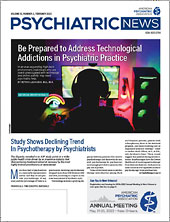Results from a large clinical study have provided more evidence that collaborative care—a model which integrates mental health or other specialty care into primary care settings—can improve the mood and quality of life of people with heart failure. Collaborative care did not appear to reduce mortality or hospitalization in these patients more than doctors’ usual care, echoing a trend seen in previous studies of patients with heart problems. The results were published in JAMA Internal Medicine.
Heart failure, a progressive disease in which the heart muscles weaken and reduce pumping ability, affects millions of adults in the United States. Studies suggest that as many as 40% of heart failure patients have comorbid depression, which significantly increases their risk of poor health outcomes.
“As a clinical investigator, you would love to see an intervention lead to reductions in mortality or hospital readmission,” said lead investigator Bruce Rollman, M.D., M.P.H., a professor of medicine, psychiatry, biomedical informatics, and clinical and translational science at the University of Pittsburgh Medical Center. But Rollman told Psychiatric News that the study still offered encouraging results.
“We successfully delivered a collaborative care program focused on two illnesses [depression and heart failure] over the telephone,” he said. “Our use of a potent control group also demonstrated that the benefits from collaborative care for depression were due to our treatment and not just increased attention from hospital staff after discharge.”
The study, known as the Hopeful Heart Trial, included 629 adults with heart failure recently discharged from a hospital who screened positive for depression (using the nine-item Patient Health Questionnaire). The participants were divided into three treatment groups for the 12-month study:
•
Enhanced usual care: Patients received periodic phone calls from nurses who reviewed the patient’s cardiac history, provided heart failure education, and encouraged adherence to heart medications and maintaining a healthy lifestyle.
•
Blended care: In addition to discussing heart failure during follow-up calls, the nurses provided psychoeducation, monitored the patients’ mood symptoms, and discussed treatment options for depression.
•
Usual care: Patients received usual care from their physician, which could include medications for both heart failure and depression as well as referrals to specialty cardiac or mental health care.
After 12 months, patients who received blended care reported significantly better mood and mental health–related quality of life compared with the usual care group. Patients who received blended care also reported improved mood compared with patients in the usual care and enhanced usual care groups.
However, patients in all three groups had similar physical functioning, rehospitalization rates, and mortality at the 12-month follow-up.
“The study’s modest findings of improved mood are important, but the overall study results are disappointing,” noted Christopher M. Callahan, M.D., a research scientist at the Indiana University Center for Aging Research at Regenstrief Institute, in an editorial that accompanied the study. “Given that collaborative care trials for either heart failure or for depression alone demonstrate efficacy, why has the potential synergy in treating both not been realized?”
One potential reason for the lack of impact on hospital redmission and mortality may be due to the barriers that some patients face when trying to access collaborative care services, including transportation to appointments and access to healthy foods, he noted.
“[F]inancial toxicity originating from the best intentions in health care contributes to the roots of medication nonadherence, missed appointments, poor diets, lack of leisure-time physical activity, and poorer mental health–related quality of life,” Callahan wrote.
Rollman acknowledged that finances and other barriers may have impacted the effect of blended care and is planning a follow-up trial to address this; his new blended care study will employ social workers who will help heart failure patients referred to cardiac rehabilitation following hospital discharge navigate the health care landscape and address their social needs (for example, affordable medications, transportation, housing, and food).
The Hopeful Heart study was funded by a grant from the National Heart, Lung, and Blood Institute. ■
“Efficacy of Blended Collaborative Care for Patients With Heart Failure and Comorbid Depression: A Randomized Clinical Trial” is posted
here.
The editorial, “Moving Toward Fully Blended Collaborative Care: Integrating Medical and Social Care” is posted
here.

